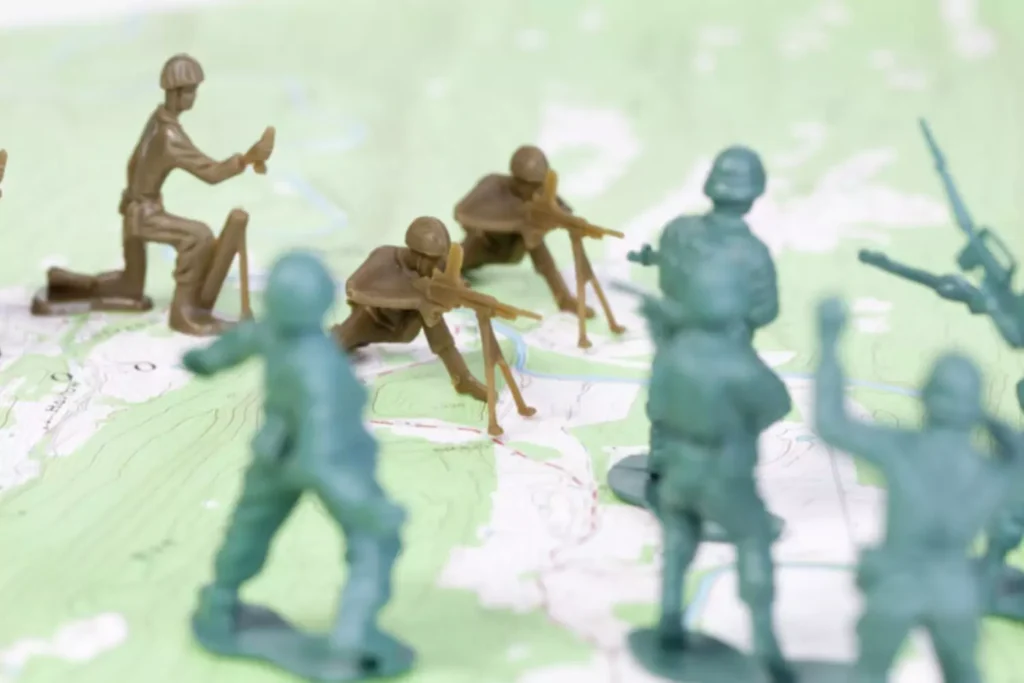Mara logs onto her socials, takes a sip of coffee, and begins scrolling through her feed. She reads about how a friend’s toddler dumped an entire jar of applesauce on the floor. She snickers at a meme posted by her cousin.
And then she sees a picture that fades her smile. About 20 of her old college friends crowd around a picnic table, laughing faces posed to commemorate a summer afternoon.
If it were four years ago, Mara would have been there, too. Now the only connection she has with her one-time close Christian community is a lingering digital facade.
Sometimes she still wonders how it all happened. How could a difference of opinion between two people devastate so many relationships? How could one disagreement change her life so completely?
Mara isn’t alone in this experience. I’ve been there myself. One day everything seems fine, and the next your whole world is on fire (James 3:6).
Fire
Two seminary students disagree about a Scripture passage. Two single women realize they are interested in the same man. One man goes to his friend about a perceived sin. A girl breaks up with her boyfriend. Two mothers disagree about how the church nursery should be run.
Sparks fly.
While conflict can be an opportunity to grow (Proverbs 27:17), we too often let our passions get the best of us (James 4:1). We are jealous and selfish (James 3:16), so we quarrel.
Sometimes we fight openly — verbally attacking the person who has offended us. Other times, we are more subtle — excluding that annoying girl from our parties, avoiding eye contact with that man who wouldn’t help with our ministry.
Whatever our weapons, Paul calls such battles the works of darkness (Romans 13:12-13). He repeats, “I warn you, as I warned you before, that those who do such things will not inherit the kingdom of God” (Galatians 5:19-21, ESV).
Yet, somehow deaf to his warnings, we open our mouths and blow wind onto the flames.
Wind
Conflict is supposed to be handled privately (Matthew 18:15). Occasionally, we may need reconciliation support from “one or two” (Matthew 18:16). In extreme cases, we may have to warn our friends about a dangerous individual (2 Timothy 4:14-15).
But we find other reasons to talk, don’t we? We tell ourselves we need advice. We need sympathy. We need someone to understand, to validate us, to tell us we aren’t crazy — to tell us we are right.
So we make a triangle. Larry Shallenberger explains:
The triangle is the cancer cell of the body of Christ. Party A is upset with Party B. Instead of directly confronting B, A complains to C. Call it venting, problem solving, or sharing a prayer request, but it’s really sin. C forms a negative opinion of B and unwittingly joins the conflict. If C tells the story to D, a new cancer cell is born.
James states it bluntly — “Do not speak evil against one another” (James 4:11). Pastor Timothy Keller writes that speaking includes more than words:
“Don’t grumble (literally, don’t groan and roll your eyes) against each other” (James 5:9). Here James refers to a kind of against-speaking that is less specific than a focused slander or attack. It is hinting with not only words but also body language—shaking one’s head, rolling eyes, and reinforcing an erosion of love and respect for someone else.
We listen to such prohibitions, and we nod our heads in agreement. We know that gossip is wrong in all its forms.
Still, when our frustration is piqued or our feelings are hurt — it’s just too hard to resist. So we raise an eyebrow. We seek counsel. We post a seemingly-innocent status update. We tell a hypothetical story about characters we pretend our friends don’t recognize. We ask for prayer.
We fan the flames. Wind carries the sparks. Spot fires catch. Tim Keller continues,
As a result, we can have second- and third-order unreconciled relationships. That is, we feel alienated from people who are friends of the person our friend is alienated from! The problem with this is obvious – there is no direct way to heal such breaches. If someone is avoiding you because your friend is mad at his or her friend, there is no “wrong” that you can confess or repent for. It is a spiritually poisonous situation.
How many of us have been there? I sure have. I once had a friend confess to getting counsel about a conflict we were having from four of our mutual friends. Four. I felt so stuck, wishing I could clear my name but not wanting to gossip myself.
Mara knew how destructive triangulation could be. When she realized rumors were circulating about her disagreement, she kept her mouth shut, hoping that vacuum would smother the flames. Sadly, the wind only blew stronger in her direction, as friend after friend heard the “other side” and started treating Mara differently.
Mara focused her efforts on reconciliation. At one point a couple friends even tried to help, but their attempts to douse the flames were useless.
James says the tongue is a small fire that can burn up a great forest (James 3:5). It took two years for her to realize that sometimes a fire gets so big that you can’t fight it without a lot of support.
Rain
Common sense tells us that the bigger the fire, the more manpower is needed to put it out. The same is often true when conflicts rage out of control. Sometimes the church has to get involved. Paul understood this need for accountability:
I entreat Euodia and I entreat Syntyche to agree in the Lord. Yes, I ask you also, true companion, help these women, who have labored side by side with me in the gospel together with Clement and the rest of my fellow workers, whose names are in the book of life (Philippians 4:2-3).
When I read this passage, I sometimes wonder what caused the disagreement between Euodia and Syntyche. Was it theology? Ministry practices? A mutual friend? Did insecurity drive them to compete with each other?
Though I can’t know what turned these sisters-in-Christ against each other, I do know that the fire between them was big enough for Paul to feel its heat 800 miles away in a Roman prison. Clearly, the situation needs to be addressed. Paul doesn’t scold the women, however. He doesn’t give them a trite command to forgive. He doesn’t point out which side is in the right and insist the other submit. Instead, he asks the recipient of the letter to help them.
As fallen beings, we often need help. Sometimes it’s enough for one or two people to show us our error. When the issue is serious, however, we may need accountability from the wider Christian community (Matthew 18:17).
Mara’s situation was serious. Two years after the conflict started, Mara found out about yet another rumor circulating about her — this one particularly slanderous. Desperate, Mara prayed. Finally, she did the only thing left for her to do: She contacted everyone who was aware of the conflict and asked for their help. She asked that they would encourage those spreading the rumors to come to her and work things out.
Then came the stammering responses: “I don’t have enough information…” “I’m really busy these days…” “Why do you have to make such a big deal out of it…” “You need to just let go and forgive…” “I’ll pray for you…”
The words were different, but the message was the same: “I don’t want to take sides.”
Drought
In a way, Mara’s friends were right. It isn’t usually helpful to side with one friend over the other in conflict situations. What they didn’t understand is that there is another side: the side of reconciliation.
Jesus said, “Blessed are the peacemakers, for they shall be called sons of God” (Matthew 5:9).
According to James Strong, the Greek for “peacemaker” is eirēnopoios, which means “one who restores peace and reconciliation between persons and even nations.” Paul said we have all been given this ministry of reconciliation (2 Corinthians 5:18-19). We are all called to help people be reconciled to God, and part of this process is helping them be reconciled to each other (1 John 4:20-21).
Instead of running from conflict, peacemakers lovingly confront. Instead of siding with one friend or the other, they side with Christ and gently hold people accountable to reconcile.
When we fail to be peacemakers, people suffer. Relationships are burned up. Marriages fail. Churches split. In this fallen world, peace cannot be maintained outside of accountability.
I wish I could say things eventually got better for Mara, that her relationships were restored and that she now crowds into those group photos with her old friends. I can’t. Today, Mara continues to pray for reconciliation. In the meantime, she is practicing the discipline of forgiveness.
I ache for Mara and all the others whose lives have been ravaged by fiery conflicts. And I pray for God to raise up people who aren’t afraid to take His side.
Copyright 2013 Candice Gage. All rights reserved.










